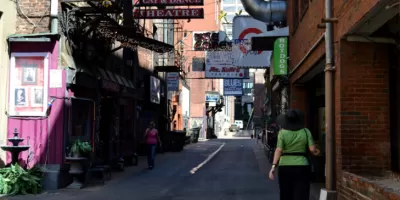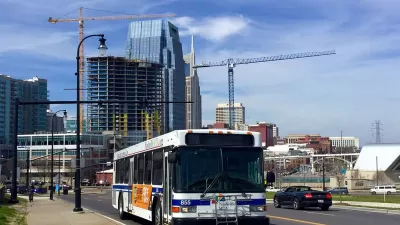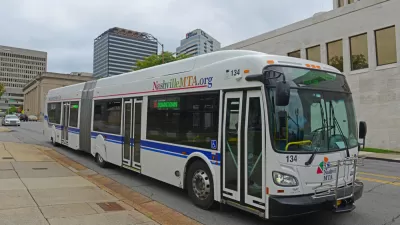An article originally posted on Mobility Lab, written by Owain James, looks for lessons from Nashville's failed transit referendum.

On Tuesday, voters handed a major defeat to transit supporters in Nashville, rejecting a $5.2 billion referendum to construct a city-wide light rail network.
But this shouldn’t deter city officials from trying again.
One of the most important lessons from successful transit referendums is that many were not successful on their first try. Key to the success of referendums is persistence. Measures that failed before can pass given different circumstances and adapting the plan based on voter preferences.
Seattle’s Sound Transit, one of the inspirations for Nashville’s light rail system, failed in its first ballot measure in 1995. Planners of the new regional system adjusted the proposal and were successful at the ballot box the next year.
Voters in Kansas City, another car-oriented city of similar density to Nashville, rejected an expansion of the streetcar starter line in 2014, but streetcar backers were able to successfully convince voters to endorse a more modest expansion of the main line in 2017.
Tuesday may have been both the best and worst time for the transit referendum in Nashville. The city is on the shortlist for Amazon’s second headquarters, yet former mayor Megan Barry resigned in disgrace just months before the vote. With the Amazon bid as a powerful incentive this time, the conservative state legislature might not give Nashville another chance at this for a while.
But Nashville shouldn’t lose hope entirely. The Amazon HQ2 bid has shown that transit investments make business and fiscal sense, and as cities continue to grow and congestion worsens, transit will only become more attractive.
If Nashville gets another chance at transit, the city should learn from this failure. It is a mistake to pin the blame entirely on the mayoral scandal, or on the Koch brothers’ “dark money.” Though these were no doubt contributing factors, dismissing the results as due to outside forces shirks responsibility and dismisses legitimate critique of the plan.
For one, the project is quite expensive, costing more than $5.4 billion for initial construction. The cost per mile of light rail, the flagship of the plan, costs nearly $125 million per mile, while “gold standard” BRT (bus rapid transit) comes in at less than half that amount. Light rail is often worth the extra cost, allowing for far greater capacity and providing greater value outside of the downtown core where land is valuable. But Nashville’s plan would have spread its 26 miles of track across four lines intersecting in the city center.
Proponents of the plan defended< the added expense of light rail as worth the price because of the permanency that would have given businesses and developers the confidence to invest in the high-density corridors. This is not incorrect, but the end goal of increased development is one that should be interrogated.
While opponents of this proposal included the usual tax critics and suburban car owners, there were also detractors who thought the plan would increase displacement. This debate has played out in Nashville before, when the city attempted to pitch the AMP bus rapid transit. Wealthy homeowners and low-income residents found themselves on the same side against AMP, though they opposed it for different reasons.
The next plan should be focused on mobility, not on development. While the rejected plan included a massive investment in bus frequency and routing, this policy should be at the heart of the next proposal. Indianapolis, which recently held a successful referendum to increase transportation, asked for only a fraction of the money that Nashville did in a proposal that emphasized the increased connectivity for residents in ballot language, and messaging to voters in the lead up to the election.
Light rail can still work in Nashville, but future proposals should focus on intercity connection, concentrating on one or two longer lines. If successful, more lines can always be added in further referendums, following the example of Seattle’s Sound Transit, which started modestly, but ramped up over time.
If Nashville gets the chance, transit proponents should not be afraid to try again with a new plan and a new pitch to voters. A more modest plan focused on bus service and segmented light rail could better appeal both to fiscal conservatives and residents concerned about development.
FULL STORY: Nashville’s next transit referendum must focus on mobility, not development

Maui's Vacation Rental Debate Turns Ugly
Verbal attacks, misinformation campaigns and fistfights plague a high-stakes debate to convert thousands of vacation rentals into long-term housing.

Planetizen Federal Action Tracker
A weekly monitor of how Trump’s orders and actions are impacting planners and planning in America.

In Urban Planning, AI Prompting Could be the New Design Thinking
Creativity has long been key to great urban design. What if we see AI as our new creative partner?

King County Supportive Housing Program Offers Hope for Unhoused Residents
The county is taking a ‘Housing First’ approach that prioritizes getting people into housing, then offering wraparound supportive services.

Researchers Use AI to Get Clearer Picture of US Housing
Analysts are using artificial intelligence to supercharge their research by allowing them to comb through data faster. Though these AI tools can be error prone, they save time and housing researchers are optimistic about the future.

Making Shared Micromobility More Inclusive
Cities and shared mobility system operators can do more to include people with disabilities in planning and operations, per a new report.
Urban Design for Planners 1: Software Tools
This six-course series explores essential urban design concepts using open source software and equips planners with the tools they need to participate fully in the urban design process.
Planning for Universal Design
Learn the tools for implementing Universal Design in planning regulations.
planning NEXT
Appalachian Highlands Housing Partners
Mpact (founded as Rail~Volution)
City of Camden Redevelopment Agency
City of Astoria
City of Portland
City of Laramie





























